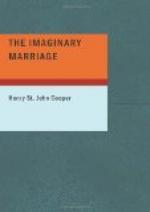“Nothing, auntie.”
“Well, you ought to be a very happy little girl. Run away.”
But Marjorie lingered. “Aunt, you haven’t heard anything of—of Hugh?” she asked.
“Hugh—Hugh Alston? Good gracious, no! You don’t think I am going to run after the man? I am disgusted with Hugh. His duplicity and, worse still, his obstinate, foolish, unreasoning behaviour, have annoyed me more than anything I ever remember. But there, my dear child, it is nothing to do with you. I have quite altered my opinion of Hugh Alston. You were right and I was wrong. Tom Arundel will make you a better husband, and you will be as happy as the day is long with him.”
“I shan’t!” Marjorie thought as she turned away. It was wrong, and it was unreasonable, and she knew it; but for the last four or five days there had been steadily growing in Marjorie’s brain, an Idea.
Stolen fruits are sweetest, stolen meetings, moonlit assignations, shy kisses pressed on ardent young lips, when the world is shrouded in darkness and seems to hold but two. All these things make for romance. The silvery moonlight gives false values; the knowledge that one has slipped unseen from the house to meet the beloved one, and that the doing of it is a brave and bold adventure, gives a thrill that sets the heart throbbing and the young blood leaping—the knowledge that it is forbidden, and, being forbidden, very sweet, appeals to the young and romantic heart.
But when that same beloved object, looking less romantic in correct evening dress, is accepted smilingly by the powers that be, and is sate down to a large and varied, many coursed dinner, then Romance shrugs her disgusted shoulders and turns petulantly away.
It was so with Marjorie. When the idea first came to her, she felt shocked and amazed. It could not be! she said to herself. “I love Tom with all my heart and soul, and now I am the happiest girl living.”
But she was not, and she knew it. It was useless to tell herself that she was the happiest girl living when night after night she lay awake, staring into the darkness and seeing in memory a face that certainly did not belong to Tom Arundel.
Hugh Alston had commenced work on the restoration of certain parts of Hurst Dormer. He had busied himself with the work, had entered whole-heartedly into all the plans, had counted up the cost, and then, realising that all his enthusiasm was only forced, that he was merely trying to cheat himself, he lost interest and gave it up.
“I’ll go to London,” he said. “I’ll go and see things, and try and get thoughts of her out of my mind.” So he went, and found London even more uninteresting than Hurst Dormer.
He had promised that he would never molest her, never annoy her with his visits or his presence, and he meant religiously to keep his word, and yet—if he could just see her! She need not know! If he could from a distance feast his eyes on her for one moment, on a sight of her, what harm would he do her or anyone?




